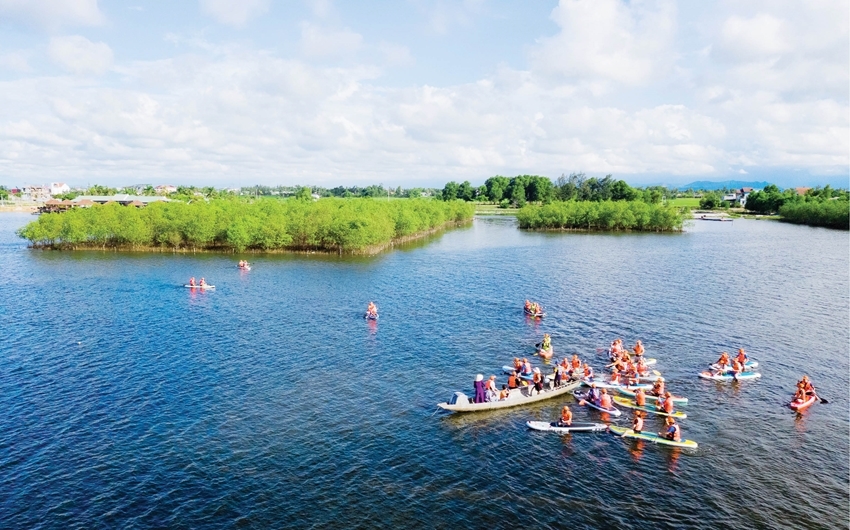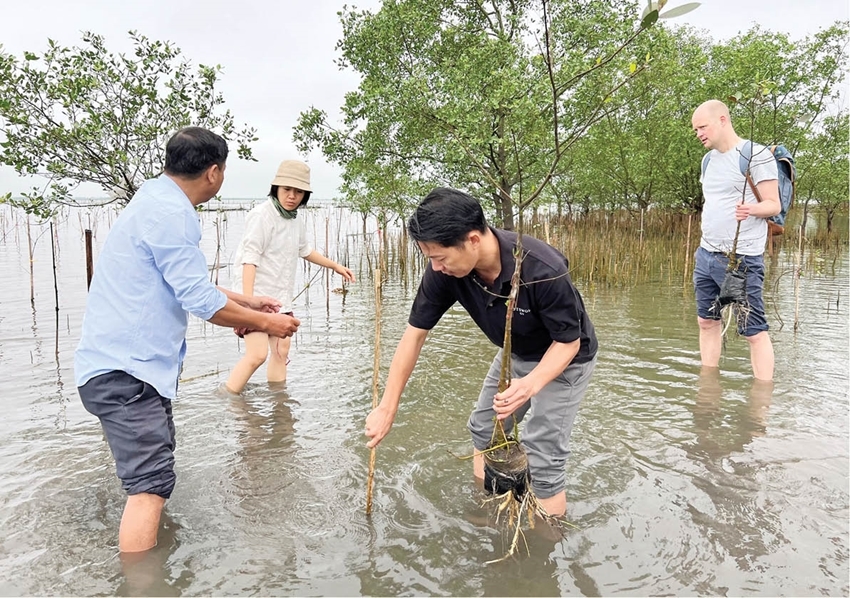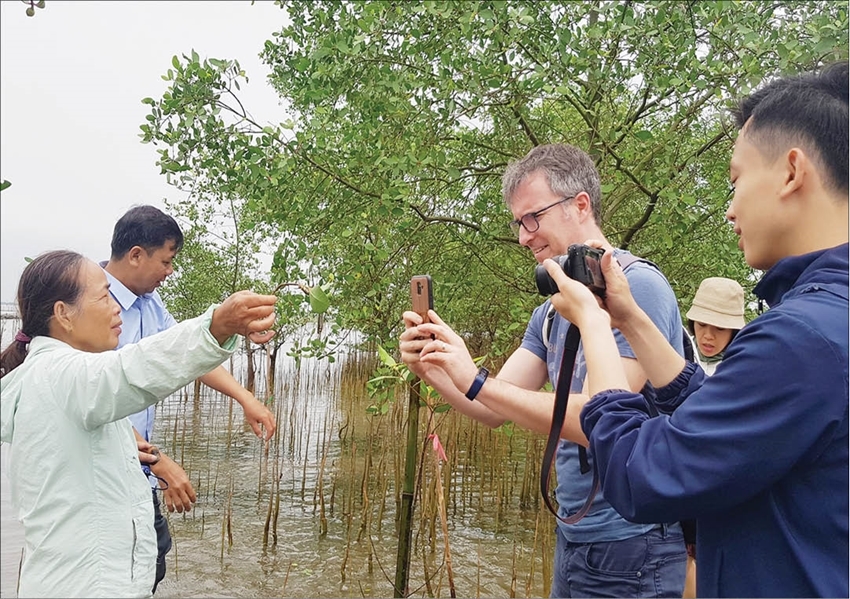   ');this.closest('table').remove();"> ');this.closest('table').remove();"> |
 |
| The Lagoon in Ngu My Thanh village, Quang Loi commune, Quang Dien district. Photo: PHAN THANG |
1.The boat rattled its engine and took our group out to the planted forest in the lagoon of Vinh Tri village, Hai Duong commune, Hue city. It was really hot and the wind blew strongly. However, we were extremely excited. Each of us was holding a seedling and in a little while, we would be planting this Sonneratia in the Tam Giang lagoon.
A few tiger prawns followed the waves, jumped onto the boat bed and flipped with crackling. I quickly grabbed a small prawn and gave it to Christian, a member of the Munich Foundation (Germany). He looked around and asked about the specialties and ecology of this area, then asked for a permission to free the shrimp into the water and said: “Go home!”
As soon as we reached the mangrove forest protection area, groups of fishes jumped to the water surface continuously. We all burst into happiness with the dance of fish and shrimp. The team leader told Assoc. Professor Philip Bubeck – University of Potsdam (Germany) that those were probably the greetings/gratitude for the safe Sonneratia shelter he had created for them. For lagoon fishermen, seeing this scene on when they are setting sail means that they will have a productive trip.
   ');this.closest('table').remove();"> ');this.closest('table').remove();"> |
 |
| Tourists are rowing SUP in Ngu My Thanh mangrove forest, Quang Loi commune, Quang Dien district |
“The feeling of planting a green seedling in the lagoon is indescribable. I wish I could be annually updated about the growth of my own sonneratia as people do with their service in a country.”
Excited to listen to people talking and checking the fish, shrimps and crabs in the sampling lừ - a multi-species catching net cage, Assoc. Professor Philip Bubeck rejoiced: “Every few years, I notice a change. In five years, I hope to see the tourism developed from mangroves and planting forests will bring many benefits to local people.”
2.Ms. Le Thi Xuan Lan, a citizen from Hai Duong commune, who supported our trip that day, had 5 years of working with afforestation and livelihood restoration projects in the lagoon area implemented by NGOs, including the Center for Social Development Research (CSRD). In addition to investing in planting 6 hectares of mangroves in the project “Strong Roots, Strong Women”, CSRD has supported communication activities for raising awareness of a group of women in 5 communes along the lagoon, created a livelihood model and piloted a mangrove nursery.
Ms. Lan has never been absent from any training or working session because she believed that “there are better schools” and all the knowledge was useful for protecting the lagoon - the source of life for her family and about 7,000 inhabitants in the commune in the lower Huong River.
Ms. Lan showed her thrilling passion as she was talking about the lagoon. She hoped that, in the future, a tourist area would be opened at the planted forests of Vinh Tri as many places have done it successfully.
   ');this.closest('table').remove();"> ');this.closest('table').remove();"> |
 |
| Mangrove beating up in Vinh Tri village, Hai Duong commune, Hue city under CSRD's project |
Over the past 10 years, more than 200ha of mangroves have been planted and developed in the lagoon areas of Tam Giang - Cau Hai. Not only improving the environment, creating shelters for fish and shrimp, mangroves also helped develop the tourism. Three birds are killed with one arrow. And now, local people are benefiting from those green forests.
Anyone who has visited the lagoon in Quang Loi commune, Quang Dien district must have been impressed with Luong Thi Hien. She is originated from Thanh Hoa province, yet she was very passionate with her husband’s hometown. Despite her informal training, her love and pride for the lagoon has made her an active guide, mastering an interesting experience tour in Ngu My Thanh area.
Luong Thi Hien’s whole family joins hands to operate the service, from welcoming guests, casting nets, cooking... This resourceful woman also covets many ideas for developing products from the sonneratia and new activities for visitors.
3.Considered as the largest water museum in Southeast Asia, the lagoon area always attracts people for its pure natural beauty and idyllic water life. With an area of 52km2 stretching across many areas, and a rich and diverse ecosystem, the brackish lagoon provides visitors with many new emotions and experiences.
   ');this.closest('table').remove();"> ');this.closest('table').remove();"> |
 |
| People are excited at and curious about the ecosystem in the mangrove forest |
In less than 0.3 seconds, Google has produced 230,000 results with countless beautiful photos of Chuon lagoon. In the Tam Giang - Cau Hai lagoon system, Chuon lagoon is a tourist destination chosen by many domestic and foreign tourists. Joining a tour operated by ASEP brought me many new emotions, even though I have been here since the service was in its infancy on stilt houses.
Ms. Ajdialla Ehantal, a tourist from Avignon, excitedly shared her feelings after the trip: “I was surprised about the culture of Chuon lagoon and the legendary story about the goddess who discovered this place. The scenery is so beautiful and poetic. It’s worth visiting and experiencing. This afternoon, we enjoyed the romantic sunset and were warmly welcomed by local fishermen.”
Mr. Trinh Dinh Dzung, a tour guide of TUI travel agency, said that almost every month in this season, he has taken guests to Chuon lagoon on the tour “Afternoon on Tam Giang lagoon” run by Hue tourist.
“Here, the air is fresh and quiet. A segment of foreign visitors set such a standard in their destination selection criteria. The depth of culture and life of the inhabitants living on the water surface make this tour attractive,” said Dzung.
Anyone who has ever been attached to the lagoon will tenderly love “the shallow sea” - the largest mangrove area in Southeast Asia. So will Ms. Luong Thi Hien and Ms. Le Thi Xuan Lan - mothers and grandmothers involving in CSRD's project “Strong Roots - Strong Women”. They tried to protect, preserve and promote the value of the lagoon… with all their love and enthusiasm. Not only them, many other residents are also joining hands to protect their livelihood and that of future descendants.
4. Many people who has spent a lot of time researching and understanding the Tam Giang - Cau Hai lagoon system, all confirm that ecotourism development is the right path for this region. In a heartwarming story, Dr. Nguyen Thi Thu Huong, who has worked on a seafood project for 7 years, said that brackish water fish and shrimp are fresh and valuable. However, there has been no branded products reaching beyond expectations.
This concern made the writer think of the “forest shrimp”, a “local brand” appearing in Ca Mau since 2016. Being named “forest shrimp” because the shrimp is naturally raised under the mangrove canopy. They only eat moss, algae, and plankton. Products from natural shrimp have been present in many places and are chosen by many customers. It is not clear that whenever Hue lagoon seafood will have its own brand and be “introduced” in a legitimate way, instead of being frozen and shipped in Styrofoam boxes to other provinces today.
During a business trip to the highlands, I accidentally met a Hue native who was once the owner of the Tam Giang Urban project many years ago. As an expert in the field of planning and consulting, he said that he was very pleased that some of the ideas of his project were heard and implemented, especially the construction of a road system, residential area planning and tourism development. He believed that, if the development was stimulated in parallel with the environmental protection, Tam Giang - Cau Hai lagoon would be a unique destination of the region, not only of Vietnam.
The lagoon system in Hue is full of attraction and mystery. The place is always attracting with many layers of value that may be a long-lasting story. During that trip, I “closed the deal” with Assoc. Professor Philip Bubeck on a return in 5 years. Hopefully at that time, we will have more interesting stories to share with each other.